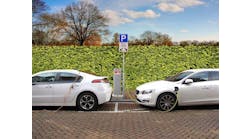Dec. 8 2017—Nissan Motor Co. says it’s aiming to introduce fully autonomous cars to the market in 2022, as the Japanese carmaker strives to establish itself as a front-runner in driverless technologies.
The carmaker plans to add autonomous-driving functions step-by-step, first allowing more cars to handle single-lane driving by themselves, and subsequently navigate urban roads, including intersections, by 2020, said Yutaka Sanada, a Nissan senior vice president, at Bloomberg’s Year Ahead Asia conference in Jakarta.
Nissan is racing with new entrants to the auto industry such as Google’s Waymo and Tesla Inc as well as bigger rivals including General Motors to develop fully-autonomous driving cars.
This past year, SEMA commissioned the Advanced Vehicle Technology Opportunity Study, featuring extensive research on autonomous technology, with help from Ducker Worldwide and the Center for Automotive Research. The intent of the study was to analyze major ADAS opportunities for members of the automotive aftermarket going forward.
As consumer interest grows and vehicles become more complex, Kaleb Silver, senior product manager for Hunter Engineering, says the growth of advanced driver-assist systems (ADAS) technologies will provide a major shake-up for the automotive aftermarket, and have a major impact on services in automotive repair shops. Not only will they need to be able to explain ADAS to customers, but technicians must also understand how to repair the ever-changing technology within vehicles.
Some highlights of the SEMA Advanced Vehicle Technology Opportunity Study include:
- The aftermarket segment for ADAS systems in the United States is currently a $976 million opportunity, which could grow to $1.51 billion in 2021, a 9.1 percent annual compound growth rate.
- Electronic content in new vehicles is now greater than 40 percent, and there will be an increased interest in replacing, retrofitting and modifying vehicle electronics systems on all cars.
- Blind spot warning and passive forward collision avoidance are the two biggest avenues of growth, with an estimated CAGR of 14 percent over the next five years.
- All vehicles will be fitted with systems by 2023.
In Japan, Nissan models including the Serena minivan, the X-Trail SUV and the new Leaf electric car are gaining popularity because of their semi-autonomous features including single-lane diving and auto parking.
Nissan said Tuesday it will test an autonomous ride-hailing service on public roads in Japan in March, aiming to officially start the “robot taxi” rides in the early 2020s.
The carmaker will put two Leaf electric cars, equipped with sensors and cameras and autonomous driving software developed by DeNA Co.
The vehicles will ply in a designated part of Yokohama, where Nissan is based. It will seek the general public to participate as passengers, through a booking application on smartphones.


